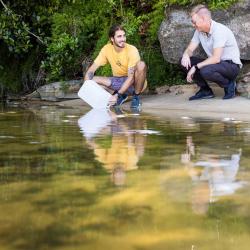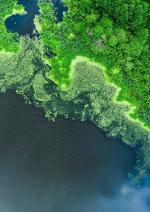The Ocean Microbiology team studies the ocean’s smallest inhabitants – the micro-organisms.
With continued increases in surface temperatures, ocean acidification, and more extreme weather, organisms inhabiting the ocean are living in an increasingly unpredictable world. Recently, increased rain events and disposal of wastewater into coastal waters are introducing a range of contaminants of emerging concern (CEC; e.g. antimicrobials, pharmaceuticals, and microplastics) that negatively impact water quality and can be detrimental to human health.
The research in the Ocean Microbes group is conducted in partnership with the government (international, national, state, and local), industry (including water authorities), and Indigenous communities. We are currently collaborating with 43 water authorities and state, Northern Territory, and local governments to build an evidence-based understanding of the environmental concentrations of these contaminants and their ecological significance in Australian coastal waters.
Our work allows us to inform policy, investment, and regulation to deliver sustainable solutions to combat climate change and improve coastal development, and in return safeguard our marine ecosystems and human health.
Feature projects

Sewage contamination of beaches
A new research collaboration has used sophisticated DNA marker approaches to determine the primary cause of poor water quality at beaches.
Ocean warming breeds microscopic threat
Scientists from UTS and Charles Darwin University are joining forces under a new ARC Discovery Project to study the impacts of potentially dangerous underwater bacteria that like it hot.
Support Us
If your passion aligns with the Ocean Microbiology Group’s, there is opportunity to be involved.
Opportunities for Impact

Australia’s coastal ecosystems feature more than 10,000 beaches and 1,000 estuaries, which provide ecosystem services valued at over $895 billion. They host diverse communities of marine plants and animals and act as important nurseries for commercially important fish species.
Our research targets some of the biggest issues facing Australia's coasts. We are dedicated to contributing new knowledge to guide on-ground management and protection of Australia’s marine environments.
Learn more about our research track record, and how you can help us make real research impact: Ocean Microbes Group - Opportunities for Impact
Find out more
Contact

Professor Justin Seymour
Team Leader, Ocean Microbiology
Phone: +61 02 9514 1776
Email: Justin.Seymour@uts.edu.au

